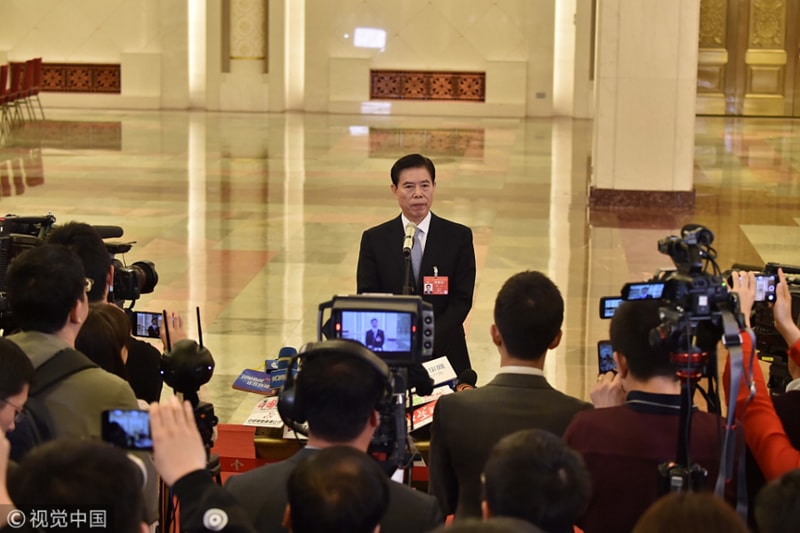Revealing the character that can turn the US-China trade war around
China's reshuffle of its trade delegation and the prominent role of a particular figure in it have raised concerns in the US.
The Trump administration is increasingly concerned about the prospects of reaching a deal with China amid Beijing's surprise reshuffle of its negotiating team and the lack of progress on core issues since the Trump-Xi meeting at the G20 summit in Japan.
|
| Chinese Commerce Minister Zhong Shan answers questions from the media on the program "Ministerial Corridor". (Source: CGTN). |
New character
Chinese Commerce Minister Zhong Shan, who some White House officials say is a hardliner on the US, has taken on a new prominent role in recent negotiations, having participated in a video conference with Chinese Vice Premier Liu He, who has led China’s trade negotiations for more than a year.
Zhong Shan’s role has been particularly notable just two months after talks between the parties collapsed after Washington accused Beijing of backtracking on commitments in a previously agreed draft. “This change shows a lack of confidence in Liu He’s role as the lead negotiator, and also demonstrates the Chinese leadership’s desire to bring in someone else,” said Dennis Wilder, a former China analyst at the CIA. “I am sure Zhong Shan’s decisions and instructions will be tougher on the US.”
Zhong, 63, was appointed commerce minister in 2017 and has experience running two state-owned companies and serving as vice governor of Zhejiang province. He is the second veteran trade official to join China’s negotiating team recently. In April, Yu Jianhua, China’s ambassador to the United Nations, one of China’s most experienced trade negotiators, returned to Beijing to join the negotiating team.
“Mr. Chung Son is the toughest of the tough,” said Stephen K. Bannon, a former White House strategic adviser.
Sharing this view, Scott Kennedy, Senior Advisor at the Washington-based Center for Strategic and International Studies, emphasized that although the Chinese Ministry of Commerce has always supported trade links and cooperation, Mr. Zhong Shan will likely fight to the end to protect the country's trade interests.
Overreaction
Some experts say the Trump administration is overreacting to China’s small personnel changes. James Green, a trade official at the US Embassy in Beijing, said it was unlikely that Liu He’s decisions would be opposed by Zhong Shan, as the two have been childhood friends.
“Some people in the White House who don’t have much experience dealing with Chinese counterparts may be reading too much into it. In fact, all the Chinese negotiators have influence over each other and they check each other,” James Green asserted.
Mr. Clete Willems, a partner at the law firm Akin Gump who worked at the White House, said that including Mr. Zhong Shan in the trade negotiation delegation may reflect China’s own political views. Like the Washington negotiating team, which includes Trade Representative Robert Lighthizer, who always wants to reach a hard-fought agreement, and Treasury Secretary Mnuchin, who is sensitive to the impact of trade tensions on financial markets, Beijing also has “hawks” and “moderates.”
“If President Xi Jinping wants to reach a trade deal with the United States, he needs to have both sides on the negotiating team,” said Clete Willems.
Hope gradually fades
Hopes of a US-China trade deal are fading as Beijing fails to deliver on its pledge to buy large amounts of US agricultural products, as agreed between President Trump and President Xi Jinping on the sidelines of the G20 summit.
In an effort to revive stalled trade talks, President Trump agreed to delay imposing additional tariffs on $300 billion worth of Chinese imports and allow telecom giant Huawei to continue buying chips from U.S. companies, in exchange for China agreeing to buy large amounts of U.S. agricultural products.
Ahead of a phone call between senior US and Chinese officials on July 9, President Trump told US trade negotiators that he was confident there would be new Chinese orders for wheat and soybeans, as promised in Osaka, Japan. However, Liu He and Zhong Shan did not make any specific commitments.
Not only that, the Trump administration has yet to reach an agreement with the Chinese government on a specific timeline for US Chief Negotiator Robert E. Lighthizer and Treasury Secretary Steven Mnuchin to visit Beijing to negotiate directly with their Chinese counterparts.
This week, many US officials and President Trump’s allies worried that China was taking advantage of the tariff delay and trying to avoid making concrete commitments. Craig Allen, president of the US-China Business Council, expressed concern about the erosion of trust between the sides.
“Republicans are generally very disappointed with China’s lack of cooperation at this stage. It’s clear that this is going to be a very slow process,” said economist Stephen Moore, an adviser to President Trump.
Many believe that Chinese officials may hold off on making any trade concessions until they see Trump’s shift at the G-20 translated into Huawei’s deals with American companies. Or China may wait out Trump’s term to begin a new phase of negotiations, as its economy, which contracted sharply in 2018, has stabilized thanks to government stimulus measures.
In fact, President Trump’s repeated threats of additional tariffs have eroded the Chinese government’s confidence in its ability to stick to any deal. “It’s very unlikely that there will be a trade deal between the parties in the near future. Because China is no longer interested in reaching a major trade deal with Mr. Trump,” Mr. Kennedy commented./.

